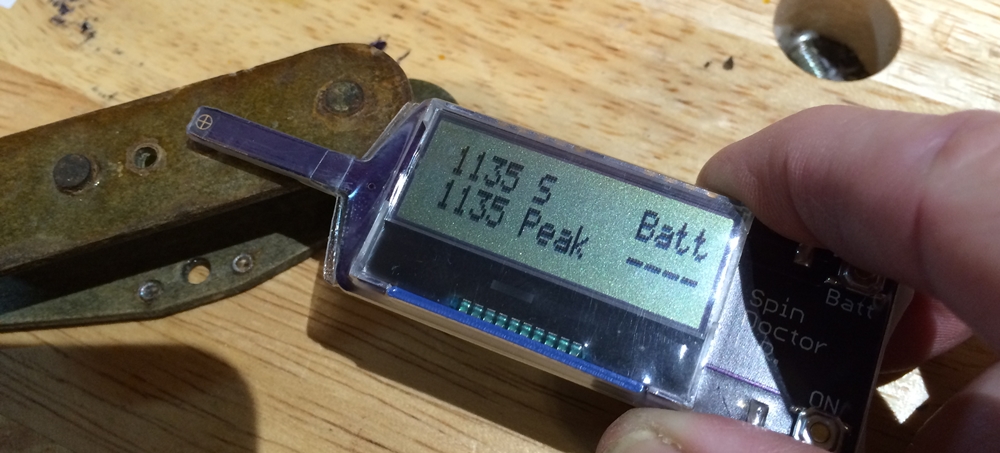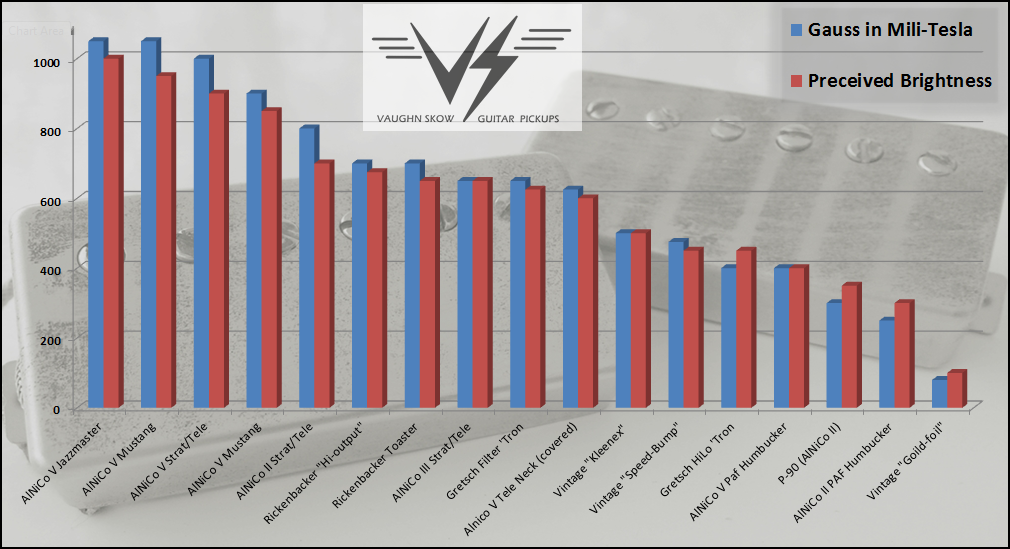Your Cart is Empty
NOW FREE SHIPPING TO 48 CONTIGUOUS UNITED STATES ON ALL ORDERS!!!
Exactly What Guitar Pickup Gauss / Magnetic Charge level means and why it's important to TONE!
by vaughn skow March 04, 2018 3 min read
Hi cyber friends! So a question came in on the WGS Forum asking about pickup Gauss levels, and I thought that would make a good full-length blog topic. This one "spec" is possibly the most important in the overall tone of a pickup, yet it's something that almost NOBODY seems to care much about ... and hardly anyone even has the ability to actually measure the Gauss level of their pickups. Holy cow ... we need to talk about this!

Checking the Gauss of a particularly highly charged Alnico V Telecaster Bass pickup from the 1970's. (This is about as high as A5 gets.)
If you want it super-duper short-n-sweet, here it is: the more powerful the magnet, the brighter the tone. But y'all are true tone seekers, right ... you'll never settle for the abbreviated route, so let's dig in deep. First and foremost I want to dispel the idea that WAAAY too many folks have that the DC resistance is the most important spec in determining the tone of a pickup, in fact that is probably the LEAST important specification! Think about this: if you have a pickup that measures, say 10K-ohms of resistance and you remove the magnets and/or pole pieces ... it will STILL measure 10K-ohms of resistance ... but it won't make any sound whatsoever! "But hey dude, it's 10K, so it's a high-output pickup man". Bull crap! Resistance simply measures is how hard it is for electrons to travel from one end of the pickup coil to the other. It's like saying that because your car has really big tires it HAS to be fast. Okay, I've made my point here, right?So for now, let's forget DC resistance all together and talk about the importance of Gauss, the amount of magnetic pull a pickup has. I'll save Resistance for another blog, Sound good? So as I said above, magnets with a more powerful pull (stronger) generally sound brighter than those with a weaker pull. So, let's look at this chart that I've personally compiled of the average strength of a pickups magnetic pull at the pole pieces (in mili-gauss/mT) and the inherent brightness of the pickup.

As you can see, brightness almost, but not quite exactly follows the Gauss level.
One important thing to remember is that these are "average" levels, but the actual level varies greatly from pickup to pickup. Just because two different guitars sport "Alnico V" pickups does NOT mean those pickups will sound the same. For instance, vintage Alnico compositions often were weaker than modern compositions, and thus less bright. In fact magnetic compositions vary quite a bit, this really becomes a problem with modern mass production of pickups where they zap dozens or hundreds of magnets at a time in an industrial magnetizer ... often never taking into consideration variances in the material or even checking the resultant Gauss level of the pickups. Furthermore, over a vintage guitars lifetime, it may encounter many activities that can serve to de-gauss the pickups and thus make it less bright; for instance, being sat up against or on top of a speaker cabinet or going through x-ray machines.
So, the take-away here is this:
Magnetic strength greatly effects the tone of a pickup, and can often vary greatly due to material variations and in the case of vintage instruments, environmental exposure. So ... it's important that you actually KNOW the Gauss level of your pickups. It's a laborious process, but I actually check and record the exact Gauss level of every pole-piece on every pickup I make. Honestly, there is no other way to ensure consistent quality/tone. I'm not sure if there are any other manufacturers who do this, but I couldn't imagine NOT doing it. I know of many high-end guys who are big names in the business that just purchase all their magnets pre-charged and never even bother to measure the Gauss for proper and consistent level. Man, that sucks. I can't imagine being that lacks and still attaching a premium price to my product! So, if you only buy MY pickups, you can pretty much be assured that the Gauss has been checked and ensured to be at the optimum level for that particular design. However, with other manufacturers, you might just want to have your own Gauss meter hand!
Which meter? That's a topic on it's own, one that has been covered HERE.
Leave a comment
Comments will be approved before showing up.
